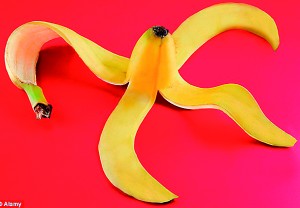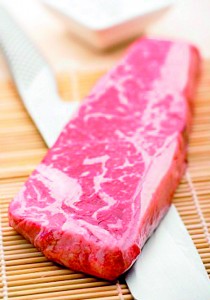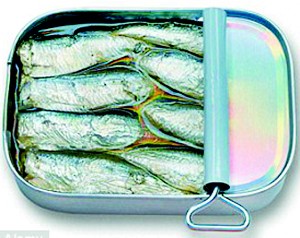Sunday Times 2
Grumpy? Eat a steak. Eat the right vitamin for your ailment
Could that niggling health problem actually mean you’re deficient in something? Learn what your body might be trying to tell you about the vitamins and minerals you could lack.
Cracks at the side of your mouth could mean you lack: Vitamin B2.
RECOMMENDED DAILY AMOUNT (RDA): 1.3mg for men, 1.1mg for women.

Bananas, particularly high in potassium, will help prevent one from getting puffy ankles
Fissures and sores around the mouth can point to a deficiency of vitamin B2 – the nutrient is essential for cell production and growth. Without it, the body cannot renew skin and mucosal cells around the lips quickly enough.
The vitamin is also required for processing food into energy, so fatigue and migraines can point to B2 deficiency symptoms, too.
A fifth of 11 to 18-year-old girls and about one in eight women have an inadequate vitamin B2 intake, according to the government’s National Diet and Nutrition Survey. (Males are less likely to be affected because they eat more calories and, therefore, more food and nutrients in total.)
Food soloution: Dairy products – milk- drinkers are very unlikely to lack vitamin B2 and adding just one 250ml glass daily (bumping up intake by 0.6mg) should solve a deficiency.
Little sense of taste could mean you lack: Zinc.
(RDA): 5.5-9.5mg for men, 4-7mg for women.
Poor zinc intake can affect our sense of taste. In research carried out at the University of Ulster involving 387 people, those who had lower levels of zinc in their red blood cells were less able to detect salty tastes.
How low zinc levels affect taste is unclear, but might be because zinc is required for the production of salivary enzymes and development and maintenance of tastebuds in general.
Other signs of zinc deficiency can include more frequent infections, such as colds and flu, and delayed healing of wounds, probably because the mineral has a vital role to play in the functioning of the immune system and in the repair and renewal of cells.
Teenagers are most at risk, with around a fifth of girls and a tenth of boys in this age group having unacceptable zinc intakes because of their diet
Food solution: Red meat – beef and lamb are among the best sources of zinc, so aim to eat one to two portions the size of an 8oz steak or equivalent a week. Other sources include nuts, especially cashews and peanuts, and whole grains.
Stomach upset could mean you lack: Vitamin A.

Beef and lamb steaks are an excellent source of zinc
(RDA): 0.7mg for men, 0.6mg for women.
According to the government’s National Diet and Nutrition Survey, around one in eight teenagers, of both sexes, and 10 per cent of men get too little vitamin A and could be at risk of minor vitamin A deficiency.
Fewer women (6 per cent) are deficient, probably because women tend to eat more carrots and greens containing vitamin A.
The most likely sign of low intake is poorer ability to stave off minor infections because the nutrient is needed to manufacture the protective mucous surfaces that keep bugs from entering the respiratory tract and gut.
Food soloution: A deficiency is easily solved, either by eating a carrot every day or having an occasional meal of liver (even once every two weeks is enough). Pregnant women shouldn’t eat liver, though, as too much vitamin A can harm the foetus.
Feeling grumpy could mean you lack: Iron.
(RDA): 8.7mg men, 14.8mg women.
Pale skin, light-headedness and spoon-shaped nails are oft-quoted signs of iron deficiency. But feeling cranky (along with tiredness and poor concentration) is a more common early symptom due to reduced levels of oxygen going to the brain, according to the U.S.National Library of Medicine.
Iron is a key component of red blood cells, and allows them to pick up oxygen and transport it around the body.
Up to 30 per cent of teenage girls and 17 per cent of women are affected by a low iron status, with risk being higher in women who have heavy periods.
Food soloution: Red meat, nuts and greens – animal sources of iron such as beef, eggs and sardines are absorbed best, but nuts, pulses, green veg and fortified breakfast cereals are also good if taken with a source of vitamin C, e.g. orange juice, to boost absorption. Supplements may be the only solution in more severe deficiency.
Puffy ankles could mean you lack: Potassium
(RDA): 3,500mg
Potassium helps regulate the body’s water balance and a low potassium intake, particularly when combined with too much dietary salt, can contribute to high blood pressure (you retain excess water that can cause blood pressure to rise).

Sardines are full of Vitamin D, which keeps bones strong
Data from 3,300 people enrolled in the Dallas Heart Study in the U.S. showed that the amount of potassium in urine samples – reflecting dietary intake – was strongly related to blood pressure reading.
Nearly a quarter of all women and teenagers and 16 per cent of over-65s have low intakes as a result of their diet, according to National Diet and Nutrition Survey data.
Food soloution: Eating at least five portions of fruit and veg- etable every day will help ensure you’re not deficient. Bananas are particularly high in potassium.
GEN Aches could mean you lack : Vitamin D
(RDA): 5mcg.
Weak bones are the sign of a severe, long-term vitamin D deficiency, but widespread aches, weakness and tiredness can indicate a milder deficiency
‘If a patient has several musculoskeletal diagnoses over time (for example, plantar fasciitis – a common cause of foot pain, hip, back and knee pain) then vitamin D deficiency should be suspected,’ says Manchester-based GP, Dr Avril Danczak.
Low vitamin D levels occur across all age groups. Vitamin D helps regulate the minerals calcium and phosphorous, vital for developing and maintaining bone and muscle.
As well as keeping bone strong, the vitamin is thought to be important for the immune system and may boost cancer protection.
Food soloution: Oily fish – if you eat two portions a week of fresh or tinned salmon, sardines or pilchards, it’s unlikely you will be deficient, especially if you spend 20 minutes outside each day without sunscreen when it’s sunny (so vitamin D can be made in the skin).
© Daily Mail, London
Follow @timesonlinelk
comments powered by Disqus

